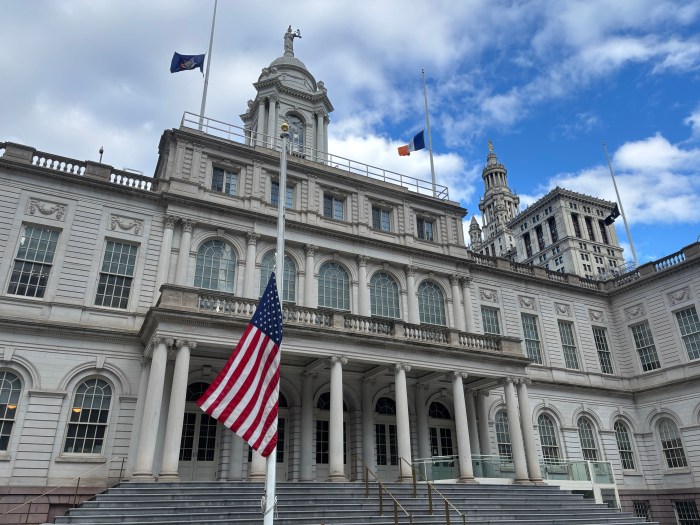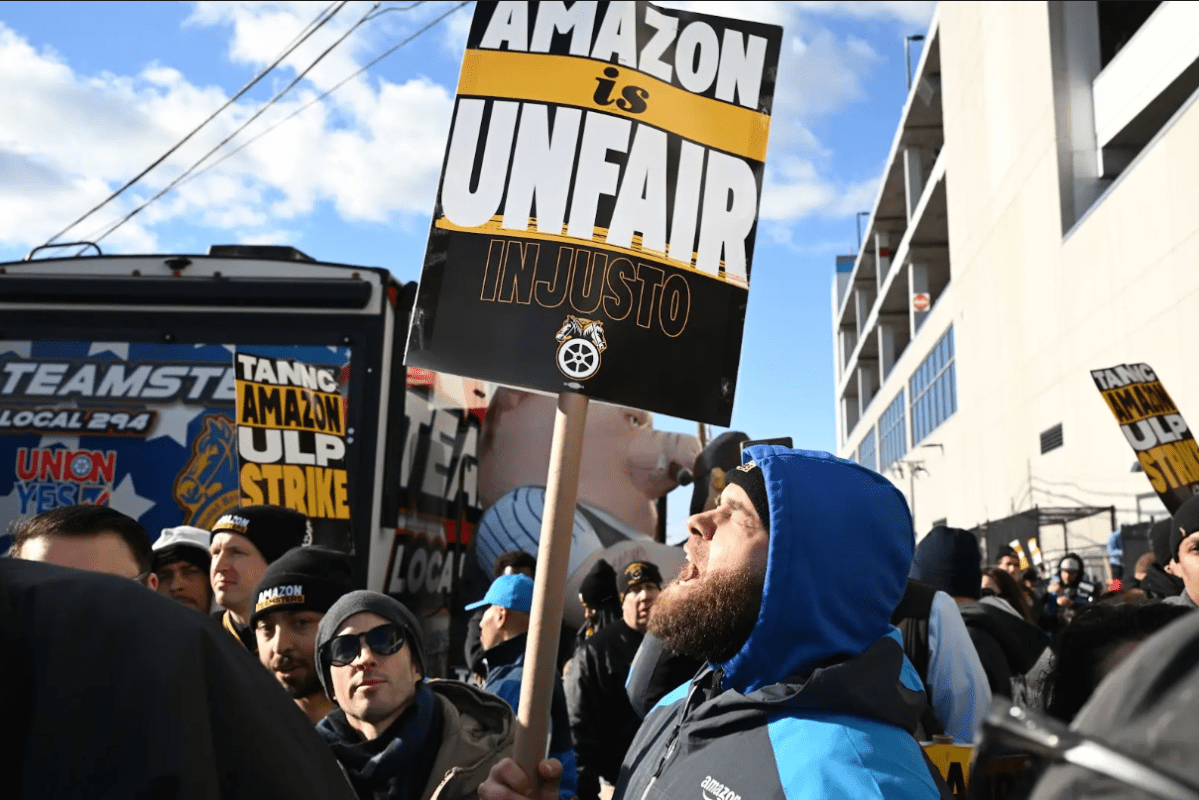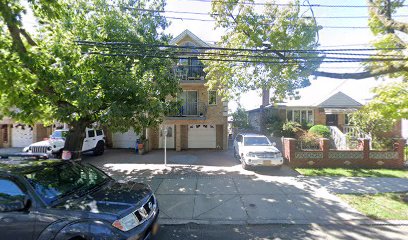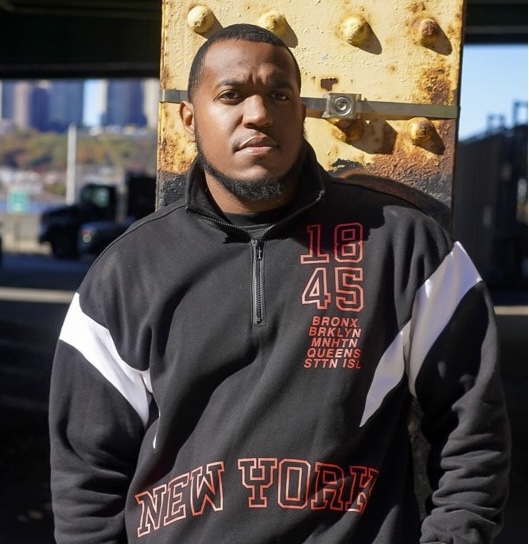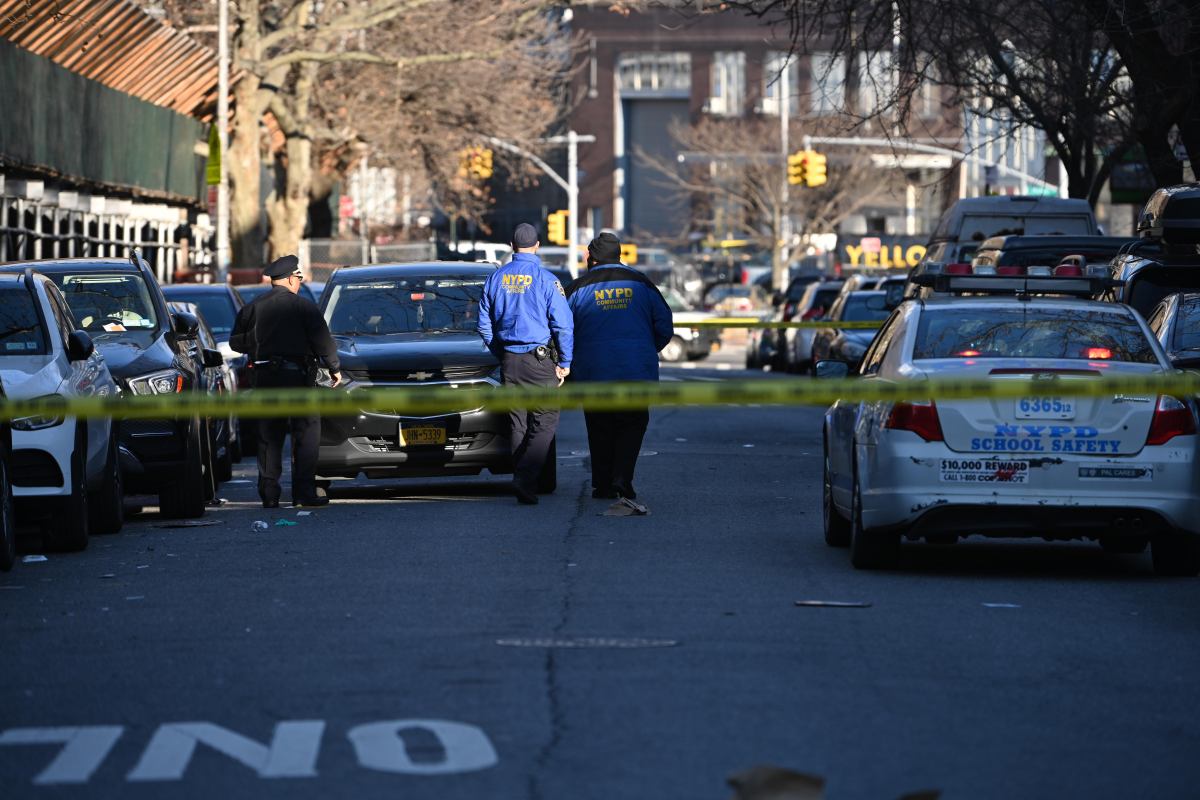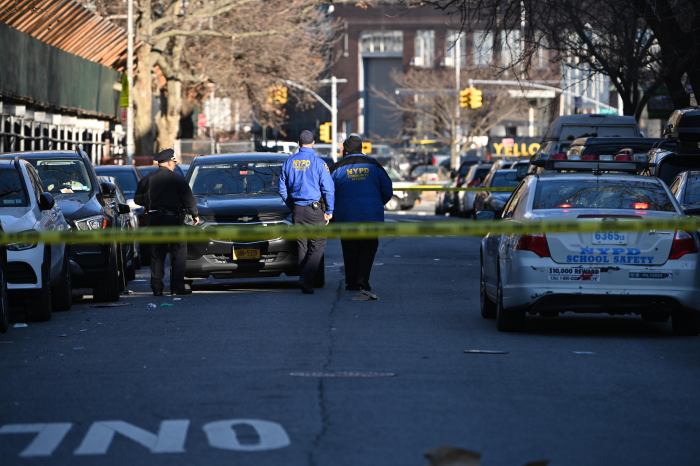
Melissa Mark-Viverito vacated her position as speaker of the City Council at the end of 2017 having passed several progressive pieces of legislation during her four-year term.
As the first member of the council’s Black, Latino and Asian Caucus to be speaker, she mainly focused on immigration reform, criminal justice reform and affordable housing issues.
Some of Mark-Viverito’s sponsored legislation, however, did not make it past City Council before the end of her term. In 2017, she introduced a street vendor bill that would add 300 new licenses to vend food in the city every year until 2028 but the legislation never made it to a full council vote.
Having reached her term limit, the 48-year-old will now pass the torch to Councilman Corey Johnson (D-3rd District), who was elected the new speaker on Wednesday.
Before Johnson begins his own legacy, we took a look back at some of Mark-Viverito’s achievements as City Council speaker.
Department of Correction and NYPD are no longer required to comply with ICE requests
A major piece of legislation that helped solidify New York City’s status as a so-called “sanctuary city” was a series of bills sponsored by Mark-Viverito, which put restrictions on the Department of Correction and NYPD compliance with detainer requests issued by federal Immigration and Customs Enforcement officials.
Previously, ICE officials could intercept immigrants coming out of DOC or NYPD custody and detain them in deportation proceedings. Upon their request, the city agencies had to hold the individual for 48 hours so that ICE officials could assume custody.
Mark-Viverito introduced the two immigration reform bills on Oct. 7, 2014, which state that the DOC and NYPD need only comply with ICE detainer requests if officials also present a warrant from a federal judge. The agencies would also only need to detain the individual if they had been convicted of a violent crime or were on a terrorist watchlist. By putting restrictions on the agencies’ compliance, the bill protects immigrants in the city from being put through deportation proceedings for low-level offenses. The bills also prohibit the presence of ICE officials at any of the city’s agencies, including the Rikers Island jail complex.
The bills were signed into law by Mayor Bill de Blasio roughly a month later, on Nov. 14, 2014.
“This bill sends a strong message that while our nation’s leaders have dragged their feet on immigration reform – New York City can and will lead,” Mark-Viverito said in a statement at the time. “No longer will a person be unnecessarily sent through senseless immigration red tape under the new law.”
On Dec. 1, 2017, de Blasio signed a third bill into law, also sponsored by Mark-Viverito, that added the city Department of Probation in the list of agencies allowed to ignore ICE detainer requests.
Non-English speakers are better accommodated by city agencies
In another legal move designed to help immigrant New Yorkers, Mark-Viverito sponsored two pieces of legislation at different times during her speakership that require city agencies to better accommodate non-English speakers.
The most recent bill, adopted as a city charter rule on March 18, requires all city agencies providing direct public or emergency services to also make available translators and interpreters for four new languages – Arabic, Urdu, French and Polish. The bill added on to six existing languages that the city already provides translators for, which are Spanish, Russian, Haitian Creole, Korean, Chinese and Bengali.
According to the Mayor’s Office of Immigrant Affairs, the bill means that an additional 5 percent of New Yorkers, now totaling 86 percent, have access to government documents and services in their native language.
In addition, city agencies now have to service non-English speakers in more than 100 languages over the telephone, according to the law.
Another initiative introduced by Mark-Viverito came earlier, in 2015, which requires the already existing business owners’ bill of rights to be made available in six additional languages. The law also requires agencies to provide language translation services during inspections at businesses owned by non-English speakers.
Cooling towers are required to undergo regular inspection
In July 2015, the largest Legionnaires’ disease outbreak recorded in New York City caused 12 deaths, according to a report by the city Department of Health and Mental Hygiene.
When officials determined cooling towers were the source of the outbreak, Mark-Viverito introduced a bill in the City Council that requires all cooling towers to be registered with the city Department of Buildings and undergo quarterly inspections. On Aug. 18, 2015, de Blasio signed the bill into law, making it the first piece of legislation in the country to regulate cooling towers.
“As we continue to ensure that everyone who is suffering from Legionnaires’ disease gets proper treatment, we must also look to the source of the problem,” Mark-Viverito said in a statement.
The law imposes a $10,000 penalty on those that don’t comply with the inspections, and a $25,000 fine on those that fail to disinfect cooling towers that pose a health risk to the city’s population.
Two days later, city health officials declared the outbreak over.
Tenants are protected from unlawful buyout offers from building owners
Cracking down on tenant harassment, Mark-Viverito introduced a bill that restricts building owners’ ability to make repeated buyout offers to tenants in rent-regulated apartments.
Signed into law by de Blasio on Sept. 3, 2015, the legislation made it illegal for a building owner to extend a buyout offer within 180 days of the tenant refusing one.
Mark-Viverito also supported two other bills, which made it illegal for building owners to threaten or lie to a tenant and banned buyout offers without informing the tenant of their rights.
“New Yorkers living in rent-regulated housing have the right to stay in their homes if they wish, and should not feel pressured, intimidated or coerced into accepting offers they don’t want to take,” Mark-Viverito said in a statement issued by the mayor’s office at the time. “With today’s bill signings, New York City is ensuring that tenants are protected from harassment and coercion.”
City-owned buildings are required to be built to consume less energy
On March 28, 2016, Mark-Viverito’s sponsored legislation to impose tighter rules on the energy consumption of city-owned buildings was signed into law by de Blasio.
It requires that new city-owned buildings, or any additions to existing buildings costing $2 million or more, comply with a higher Gold standard on the rating system used by the city – Leadership in Energy and Environmental Design, or LEED. To comply with the Gold standard, city buildings are required to cut energy use by 50 percent, according to the Urban Green Council.
“This will ensure our buildings conserve as much energy as possible, and also generate renewable energy where possible,” de Blasio said at a public hearing for the bills.
Penalties are reduced for low-level offenses
As part of the Criminal Justice Reform Act of 2016, Mark-Viverito put low-level offenses – urinating in public and spitting, carrying an open container of alcohol, violating parks department rules, and making excessive noise – into perspective in a series of eight bills that reduce penalties for such violations.
The package of bills reduces fines for these violations, shortens jail time for violators and offers the option to dole out community service in lieu of paying penalties. The bills are expected to divert more than 100,000 criminal cases per year to the city Office of Administrative Trials and Hearings, an independent court in the city that holds hearings for summonses issued by other city agencies, according to Marisa Senigo, a spokeswoman for OATH.
Previously, criminal summonses would have been issued for these types of violations, which could have led to an arrest warrant if ignored.
The legislation, signed into law by de Blasio on June 13, 2016, ensures that the NYPD uses civil penalty options instead. Celebrated as a way to reduce the rate of incarceration, the laws are expected to save approximately 10,000 people per year from acquiring a criminal record and prevent the creation of 50,000 arrest warrants a year, according to Mark-Viverito’s statement issued by the mayor’s office.
“Today, New York City is standing up for justice, for progress, and for fairness,” Mark-Viverito said in the statement. “[The bills] will keep our city safe, ensure proportional penalties that fit the crime and bring more justice to a criminal justice system that needed it for far too long.”
Homes and businesses are safer from being shut down unfairly
Mark-Viverito, along with 11 council members, cracked down on the city’s Nuisance Abatement Law with legislation that curbs the NYPD’s power to quickly shut down residences and businesses suspected of illegal activity.
The Nuisance Abatement Fairness Act, a package of 13 bills, was signed into law by de Blasio on March 18, 2017.
In cases of drug-related crimes, the city Law Department needs to submit a lab report proving the presence of drugs before filing a Nuisance Abatement action in court. Another piece of legislation requires officials to inform defendants of their violation and give them a chance to plead their case before shutting down their establishment.
“For too long, the Nuisance Abatement Law has been unevenly applied,” Mark-Viverito said in a statement released by the City Council at the time. “This package of legislation will reform these laws to eliminate the most draconian penalties, and limit its application to ensure that innocent people do not lose their homes or businesses, all while permitting the swift shuttering of illegal houses of prostitution, bodegas that sell K2, and other actual nuisances where appropriate.”
NYPD is required to give gun violence warnings to firearm license applicants
Akin to the warning provided by cigarette manufacturers, Mark-Viverito sponsored legislation that requires the NYPD to issue a warning to people applying for a firearm license or permit.
The warning covers “the increased risk of suicide, death during domestic violence disputes, and unintentional deaths to children,” she said on Oct. 3.
The bill, which came on the heels of the Oct. 1 mass shooting that killed 58 people and injured more than 500 in Las Vegas, was signed into law by de Blasio on Dec. 1.
“Our city has one of the strongest gun laws in the nation and our regulations should serve as a model for the country,” Mark-Viverito said while announcing the legislation at a City Council meeting. “We strongly oppose any federal legislation that would weaken our laws, undermine our efforts, and put our city at greater risk of gun violence.”
Conversion therapy is banned in the city
On Dec. 31, 2017, the City Council passed legislation that bans people from charging for conversion therapy treatments that aim to change an individual’s sexual orientation or gender identity.
The bill, which is currently awaiting the mayor’s signature, will impose fines ranging from $1,000-$10,000 on violators.
“We will ensure all individuals will be able to live without fear of coercion to change into someone they are not,” said Mark-Viverito, the bill’s prime sponsor.
East Harlem residents are helping with the neighborhood’s rezoning
The East Harlem Neighborhood Plan, spearheaded by Mark-Viverito, was created to gather community input ahead of the city’s rezoning initiative announced in 2014.
In February, Mark-Viverito’s team met with community residents and local businesses to deliver a comprehensive guide detailing the neighborhood’s priorities to the Department of City Planning. A total of 232 recommendations were made in the plan, notably involving concerns related to affordable housing, small businesses, safety of seniors and education.
Mark-Viverito’s main goal for the rezoning, as detailed in the plan, is to preserve the character of the community and ensure that long-term residents are able to live out their lives in the neighborhood.
While serving as the council speaker, she made headway with the latter through her bill requiring the Department for the Aging to create and distribute a guide to building owners detailing how they can ensure older tenants live comfortably in the building.
Signed into law by de Blasio on June 2, 2015, the legislation resulted in the “Aging in Place Guide for Building Owners,” which makes recommendations to landlords such as installing textured flooring, handrails and better lighting to accommodate older residents.
The rezoning proposal, which was advised by the recommendations in Mark-Viverito’s neighborhood plan, has been met with severe criticism. One notable opponent is Manhattan Borough President Gale Brewer, who despite being in favor of the rezoning itself, did not accept the administration’s proposal. Some of her critique details how the plan fails to “provide a significant enough upfront preservation effort to stem the loss of existing affordable housing in East Harlem,” and “Does not address many of the needs identified by the community,” according to a statement from her office.
Despite the opposition, the city’s East Harlem rezoning plan passed the City Council on Nov. 30, 2017.





